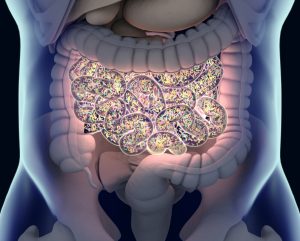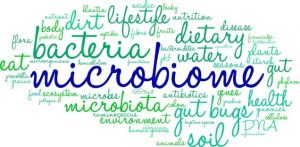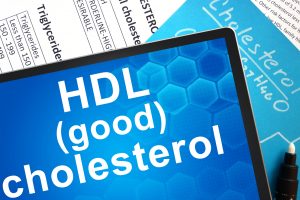What Is The Truth About Our Microbiome?
 Our gut bacteria, often referred to as our microbiome, are a “hot” topic in today’s world. They have been in the news a lot in recent years. If you believe the headlines, the right gut bacteria can make you smarter, healthier, and cure what ails you. They appear to have almost mystical powers. Could a probiotic supplement make you healthier?
Our gut bacteria, often referred to as our microbiome, are a “hot” topic in today’s world. They have been in the news a lot in recent years. If you believe the headlines, the right gut bacteria can make you smarter, healthier, and cure what ails you. They appear to have almost mystical powers. Could a probiotic supplement make you healthier?
How much of this is true and how much is pure speculation? It’s hard to say. Our microbiome is incredibly complex. To make matters more confusing, the terminology used to classify our gut bacteria into groups is not consistent. It varies from study to study.
Perhaps it is time to take an unbiased look at the data and separate fact from speculation.
Could A Probiotic Supplement Make You Healthier?
 To answer the question of whether a probiotic supplement could make you healthier, we need to differentiate between what we know is true and what we think might be true. Let’s start with what we know for certain:
To answer the question of whether a probiotic supplement could make you healthier, we need to differentiate between what we know is true and what we think might be true. Let’s start with what we know for certain:
- Our gut bacteria are affected by diet. People consuming a primarily plant-based diet have different populations of gut bacteria than people consuming a primarily meat-based diet.
-
- The populations of gut bacteria found in people consuming a plant-based diet are associated with better health outcomes, but associations have their limitations as discussed below.
- Our gut bacteria are affected by exercise.
-
- It’s not clear whether it is the exercise or the fitness (increased muscle mass, decreased fat mass, improved metabolism) associated with exercise that is responsible for this effect.
Most of the other claims for the effects of gut bacteria on our health are based on associations. However, associations do not prove cause and effect. For example:
- Certain populations of gut bacteria are associated with obesity.
-
- Do our gut bacteria make us obese, or does obesity affect our gut bacteria? There is evidence to support both viewpoints.
- Certain populations of gut bacteria are associated with better mental health.
-
- Do gut bacteria influence mental health, or does the stress associated with poor mental health influence our gut bacteria? Again, there is evidence to support both viewpoints.
- Certain populations of gut bacteria are associated with better health outcomes (reduction in diseases like heart disease, diabetes, and high blood pressure).
-
- Here the question is a little different. In general, the populations of gut bacteria associated with disease reduction are produced by a healthy diet, exercise, and weight control. In this case, the question becomes: Is it the gut bacteria that caused disease reduction, or is it diet, exercise, and weight control that caused disease reduction?
To better understand these points, let’s look at four recently published studies. After reviewing those studies, I will come back to the question of whether a probiotic supplement might decrease our disease risk.
Is Our Microbiome Better Than Our Genes For Predicting Disease?
 This study (T. Tierney et al, bioRxiv, 2020) reviewed 47 studies that analyzed people’s microbiome (their gut bacteria) and their genes and asked which was better at predicting their risk of various diseases. The study focused on 13 diseases that are considered “complex” because they are caused by both genetic and environmental factors such as diet and exercise. Examples include diabetes, high blood pressure, digestive disorders, asthma, Parkinson’s disease, and schizophrenia.
This study (T. Tierney et al, bioRxiv, 2020) reviewed 47 studies that analyzed people’s microbiome (their gut bacteria) and their genes and asked which was better at predicting their risk of various diseases. The study focused on 13 diseases that are considered “complex” because they are caused by both genetic and environmental factors such as diet and exercise. Examples include diabetes, high blood pressure, digestive disorders, asthma, Parkinson’s disease, and schizophrenia.
The study found that our microbiome was a better predictor of these diseases than our genes. This finding is not surprising. Our microbiome is heavily influenced by diet and other environmental factors. Our DNA sequence is not.
This study supports previous studies in suggesting that our microbiome is a better predictor of most diseases than our DNA sequence. The exception would be diseases that are clearly caused by gene mutations, such as sickle cell disease.
Does this mean our microbiome is directly influencing these diseases, or is it merely serving as a marker for diet and other environmental factors that are influencing these diseases? Nobody knows.
Does The Mediterranean Diet Support Gut Bacteria Linked To Healthy Aging?
 This study ( TS Ghosh et al, Gut, 17 February 2020) divided people aged 65-79 into two groups. One group consumed a Mediterranean diet rich in fruits, vegetables, nuts, legumes, olive oil, and fish and low in red meat and saturated fat. The other group consumed a typical western diet. After a year on the diets the gut bacteria in the microbiomes of the two groups was analyzed.
This study ( TS Ghosh et al, Gut, 17 February 2020) divided people aged 65-79 into two groups. One group consumed a Mediterranean diet rich in fruits, vegetables, nuts, legumes, olive oil, and fish and low in red meat and saturated fat. The other group consumed a typical western diet. After a year on the diets the gut bacteria in the microbiomes of the two groups was analyzed.
The study found that the group consuming the Mediterranean diet had an increase in gut bacteria associated with healthy aging, reduced inflammation, and reduced frailty.
The title of the paper describing this study was “Mediterranean diet intervention alters the gut microbiome in older people, reducing frailty and improving health status”. But is that true?
There is already good evidence that the Mediterranean diet improves health status. Is it the gut bacteria supported by the Mediterranean diet that were responsible for healthy aging, or were other aspects of the Mediterranean diet responsible for healthy aging? Nobody knows.
Are Low Fat Diets Healthy Because Of Their Effect On Our Microbiome?
 This study (Y Wang et al, Gut Microbes, 21 January 2020) put participants on a low fat diet (20% fat and 66% carbohydrates), a moderate fat diet (30% fat and 56% carbohydrate) or a high fat diet (40% fat, 46% carbohydrates). To assure the accuracy of the diets, participants were provided with all foods and beverages they consumed. After 6 months on the three diets, the gut bacteria of each group were analyzed.
This study (Y Wang et al, Gut Microbes, 21 January 2020) put participants on a low fat diet (20% fat and 66% carbohydrates), a moderate fat diet (30% fat and 56% carbohydrate) or a high fat diet (40% fat, 46% carbohydrates). To assure the accuracy of the diets, participants were provided with all foods and beverages they consumed. After 6 months on the three diets, the gut bacteria of each group were analyzed.
Note: Because all food and beverages were provided, none of the diets included sodas, added sugar, refined flour, saturated fats, or highly processed food. In short, the diets were very different than the typical low fat or low carb diets consumed by the average American.
This study found that participants consuming the high fat, low carb diet had gut bacteria associated with increased risk of heart disease and diabetes. In contrast, the low fat, high carbohydrate diet group had gut bacteria associated with decreased risk of heart disease and diabetes.
To understand this study, you need to reevaluate what you may have learned from Dr. Strangelove’s health blog. It is true that low fat diets in which fat has been replaced with sugar, refined flour, and highly processed low-fat foods are unhealthy. But that’s not what happened in this study.
Remember that all the food and drink the participants consumed was selected by dietitians.
When you replace the fat with whole foods – fresh fruits and vegetables, whole grains, nuts, and legumes, as was done in this study, you end up with a very healthy diet.
The authors talked about the importance of the “diet-gut axis” for reducing the risk of heart disease and diabetes. However, is it the gut bacteria that influenced the risk of heart disease and diabetes, or is it the diets themselves that influenced disease risk? Nobody knows.
Can Gut Bacteria Reduce Heart Disease Risk?
 This study (Y Heianza et al, Journal of The American College Of Cardiology, 75: 763-772, 2019) focused on the interactions between diet, gut bacteria, and a metabolite called TMAO (trimethylamine N-oxide).
This study (Y Heianza et al, Journal of The American College Of Cardiology, 75: 763-772, 2019) focused on the interactions between diet, gut bacteria, and a metabolite called TMAO (trimethylamine N-oxide).
Here is what we know for certain:
- L-carnitine (found in high levels in red meat) can be converted to TMA (trimethylamine) by gut bacteria and then to TMAO in the liver.
- The gut bacteria of meat eaters are very efficient at converting L-carnitine to TMA. Thus, meat eaters tend to have high levels of TMAO in their blood.
- The gut bacteria of vegans and vegetarians are very inefficient at converting L-carnitine to TMA. Thus, people consuming a primarily plant-based diet tend to have low TMAO levels in their blood.
Here is what we are uncertain about:
- High TMAO levels are associated with increased heart disease risk. However, there is no direct evidence that TMAO causes heart disease.
What made this study unique is that it measured TMAO levels in the study participants at their entrance into the study and again 10 years later. The study found:
- Participants with the greatest increase in TMAO levels over the 10 years had a 67% increased risk of heart disease compared to participants whose TMAO levels remained constant.
- Participants consuming a healthy, primarily plant-based diet had little or no increase in TMAO levels over 10 years. It was the participants consuming an unhealthy diet who had significant increases in their TMAO levels.
This study strengthens the association between TMAO levels and heart disease risk. Because gut bacteria are required to produce TMAO, it also strengthens the association between gut bacteria and heart disease risk. However, is it the high TMAO levels that increased heart disease risk or is it the unhealthy diet that increased heart disease risk? Nobody knows.
What Is The Truth About Our Microbiome?
 By now you have probably noticed a common theme that runs through all four studies. This is also true of most published studies on our microbiome.
By now you have probably noticed a common theme that runs through all four studies. This is also true of most published studies on our microbiome.
- We have good evidence that whole food, primarily plant-based diets lead to improved long-term health outcomes.
- We also have good evidence that whole food, primarily plant-based diets influence the populations of gut bacteria found in our microbiome.
- We know the populations of gut bacteria supported by primarily plant-based diets are associated with improved health outcomes.
- We don’t really know whether it is the gut bacteria or the diets that are responsible for the improved health outcomes.
Don’t misunderstand me. I am not a microbiome skeptic. I think we have enough evidence to say that our gut bacteria are likely to have an important effect on our health. However, to claim that gut bacteria play a primary role in influencing our health would be pure speculation at this point.
A Cautionary Tale
 Why do I make this point? It’s because I suspect that some in the supplement industry will be tempted to make probiotic supplements and claim they contain bacteria “known” to reduce the risk of heart disease, diabetes, or cancer. You wouldn’t need to change your diet. All you would need to do to improve your health would be to take their probiotic supplement.
Why do I make this point? It’s because I suspect that some in the supplement industry will be tempted to make probiotic supplements and claim they contain bacteria “known” to reduce the risk of heart disease, diabetes, or cancer. You wouldn’t need to change your diet. All you would need to do to improve your health would be to take their probiotic supplement.
Lest you be taken in by such future claims, let me share a cautionary tale.
High HDL cholesterol levels are associated with a reduced risk of heart disease. Exercise and weight loss increase HDL levels. However, those require work. They aren’t easy. So, pharmaceutical companies were constantly looking for ways to raise HDL levels without the hard work.
A few years ago, a pharmaceutical company discovered a drug that increased HDL levels. They thought they had discovered a wonder drug that would bring in billions of dollars. People wouldn’t need to exercise. They wouldn’t need to lose weight. All they would need to do would be to take their drug. HDL levels would go up and heart disease risk would go down.
However, when they tested their drug in a major clinical trial, it didn’t move the needle. HDL levels went up, but heart disease risk stayed the same. It turns out it was the exercise and weight loss that decreased heart disease risk, not the increase in HDL levels.
My message is simple. Even if our gut bacteria are found to play a major role in mediating the effect of diet on health outcomes, don’t assume we can take a probiotic and forget about the role of diet and exercise. Good health starts with a whole food, primarily plant-based diet and a healthy lifestyle.
The Bottom Line
Our gut bacteria, often referred to as our microbiome, are “hot”. If you believe the headlines, the right gut bacteria can make you smarter, healthier, and cure what ails you. How much of this is true and how much is pure speculation? In this article I reviewed four recent studies on diet, gut bacteria, and health outcomes. I took an unbiased look at the data and separated fact from speculation.
There was a common theme that ran through all four studies. This is also true of most published studies on our microbiome.
- We have good evidence that whole food, primarily plant-based diets lead to improved long-term health outcomes.
- We also have good evidence that whole food, primarily plant-based diets influence the populations of bacteria found in our gut, also known as our microbiome.
- We know the populations of gut bacteria supported by primarily plant-based diets are associated with improved health outcomes.
- We don’t really know whether it is the gut bacteria or the diets that are responsible for the improved health outcomes.
Don’t misunderstand me. I am not a microbiome skeptic. I think we have enough evidence to say that our gut bacteria are likely to have an important effect on our health. However, to claim that gut bacteria play a primary role in influencing our health would be pure speculation at this point.
Why do I make this point? It’s because I suspect that some in the supplement industry will be tempted to make probiotic supplements and claim they contain bacteria “known” to reduce the risk of heart disease, diabetes, or cancer. You wouldn’t need to change your diet. All you would need to do to improve your health would be to take their probiotic supplement.
My message is simple. Even if our gut bacteria are found to play a major role in mediating the effect of diet on our health outcomes, don’t assume we can take a probiotic and forget about the role of diet and exercise. Good health starts with a whole food, primarily plant-based diet and a healthy lifestyle.
For more details, read the article above. You may be particularly interested in the cautionary tale I shared about HDL and heart disease risk.
These statements have not been evaluated by the Food and Drug Administration. This information is not intended to diagnose, treat, cure or prevent any disease
